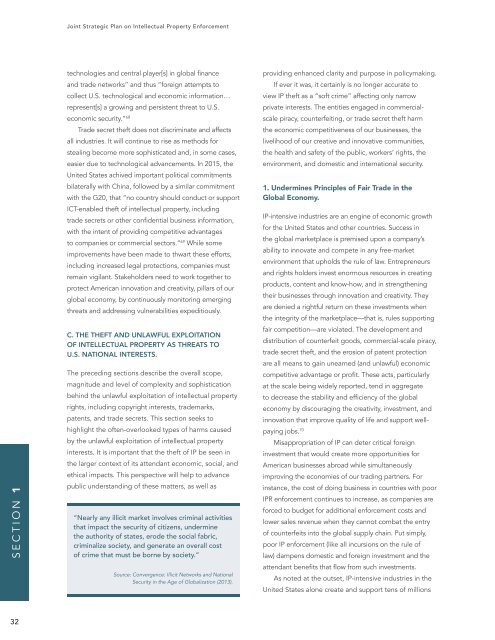ENFORCEMENT
2h1EjNw
2h1EjNw
Create successful ePaper yourself
Turn your PDF publications into a flip-book with our unique Google optimized e-Paper software.
Joint Strategic Plan on Intellectual Property Enforcement<br />
SECTION 1<br />
technologies and central player[s] in global finance<br />
and trade networks” and thus “foreign attempts to<br />
collect U.S. technological and economic information…<br />
represent[s] a growing and persistent threat to U.S.<br />
economic security.” 68<br />
Trade secret theft does not discriminate and affects<br />
all industries. It will continue to rise as methods for<br />
stealing become more sophisticated and, in some cases,<br />
easier due to technological advancements. In 2015, the<br />
United States achived important political commitments<br />
bilaterally with China, followed by a similar commitment<br />
with the G20, that “no country should conduct or support<br />
ICT-enabled theft of intellectual property, including<br />
trade secrets or other confidential business information,<br />
with the intent of providing competitive advantages<br />
to companies or commercial sectors.” 69 While some<br />
improvements have been made to thwart these efforts,<br />
including increased legal protections, companies must<br />
remain vigilant. Stakeholders need to work together to<br />
protect American innovation and creativity, pillars of our<br />
global economy, by continuously monitoring emerging<br />
threats and addressing vulnerabilities expeditiously.<br />
C. THE THEFT AND UNLAWFUL EXPLOITATION<br />
OF INTELLECTUAL PROPERTY AS THREATS TO<br />
U.S. NATIONAL INTERESTS.<br />
The preceding sections describe the overall scope,<br />
magnitude and level of complexity and sophistication<br />
behind the unlawful exploitation of intellectual property<br />
rights, including copyright interests, trademarks,<br />
patents, and trade secrets. This section seeks to<br />
highlight the often-overlooked types of harms caused<br />
by the unlawful exploitation of intellectual property<br />
interests. It is important that the theft of IP be seen in<br />
the larger context of its attendant economic, social, and<br />
ethical impacts. This perspective will help to advance<br />
public understanding of these matters, as well as<br />
“Nearly any illicit market involves criminal activities<br />
that impact the security of citizens, undermine<br />
the authority of states, erode the social fabric,<br />
criminalize society, and generate an overall cost<br />
of crime that must be borne by society.”<br />
Source: Convergence: Illicit Networks and National<br />
Security in the Age of Globalization (2013).<br />
providing enhanced clarity and purpose in policymaking.<br />
If ever it was, it certainly is no longer accurate to<br />
view IP theft as a “soft crime” affecting only narrow<br />
private interests. The entities engaged in commercialscale<br />
piracy, counterfeiting, or trade secret theft harm<br />
the economic competitiveness of our businesses, the<br />
livelihood of our creative and innovative communities,<br />
the health and safety of the public, workers’ rights, the<br />
environment, and domestic and international security.<br />
1. Undermines Principles of Fair Trade in the<br />
Global Economy.<br />
IP-intensive industries are an engine of economic growth<br />
for the United States and other countries. Success in<br />
the global marketplace is premised upon a company’s<br />
ability to innovate and compete in any free-market<br />
environment that upholds the rule of law. Entrepreneurs<br />
and rights holders invest enormous resources in creating<br />
products, content and know-how, and in strengthening<br />
their businesses through innovation and creativity. They<br />
are denied a rightful return on these investments when<br />
the integrity of the marketplace—that is, rules supporting<br />
fair competition—are violated. The development and<br />
distribution of counterfeit goods, commercial-scale piracy,<br />
trade secret theft, and the erosion of patent protection<br />
are all means to gain unearned (and unlawful) economic<br />
competitive advantage or profit. These acts, particularly<br />
at the scale being widely reported, tend in aggregate<br />
to decrease the stability and efficiency of the global<br />
economy by discouraging the creativity, investment, and<br />
innovation that improve quality of life and support wellpaying<br />
jobs. 70<br />
Misappropriation of IP can deter critical foreign<br />
investment that would create more opportunities for<br />
American businesses abroad while simultaneously<br />
improving the economies of our trading partners. For<br />
instance, the cost of doing business in countries with poor<br />
IPR enforcement continues to increase, as companies are<br />
forced to budget for additional enforcement costs and<br />
lower sales revenue when they cannot combat the entry<br />
of counterfeits into the global supply chain. Put simply,<br />
poor IP enforcement (like all incursions on the rule of<br />
law) dampens domestic and foreign investment and the<br />
attendant benefits that flow from such investments.<br />
As noted at the outset, IP-intensive industries in the<br />
United States alone create and support tens of millions<br />
32


